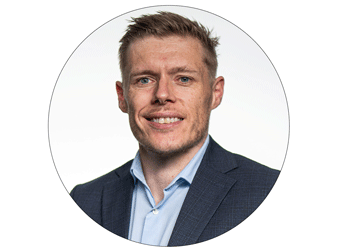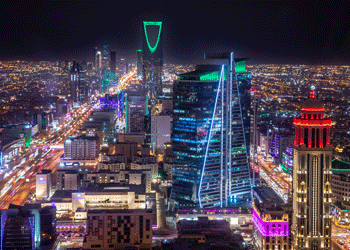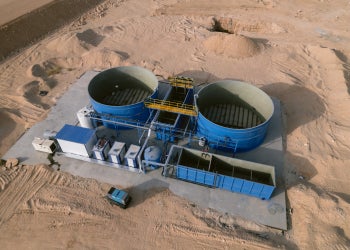Kuwait’s Gulf Centre United sets course for expansion
11 August 2023
 This month’s special report on Kuwait includes:
This month’s special report on Kuwait includes:
> ECONOMY: Stakeholders hope Kuwait can execute spending plans
> ENERGY: Kuwait’s $300bn energy target is a big test
> BANKING: Kuwaiti banks enter bounce-back mode

Kuwait-based Gulf Centre United Industrial Equipment, which specialises in the fabrication and supply of tailor-made construction equipment, has set its sights on expansion within the country, according to the company’s chief operating officer Majed Yazji.
The equipment the company makes includes rock-crushing machinery, concrete plants and asphalt units. It also acts as an agent, importing equipment made in Europe into the Middle East region.
While Kuwait has seen a dramatic decline in infrastructure project activity over recent years, Yazi is confident that the family business will be able to execute its expansion plans.
Road maintenance
One factor fuelling optimism about the firm’s future is that the country has continued to prioritise road maintenance contracts.
In May, it was announced that a road maintenance project valued at about $800m had attracted 36 contractors.
Prospective bidders included companies from Japan, South Korea, France, China, India, the US and Hungary, according to tender documents.
“This is a very big maintenance project and it gives us confidence there is going to be demand for our services within Kuwait for some time to come,” said Yazji.
There are five asphalt factories in Kuwait and Gulf Centre United Industrial Equipment is engaging with them over the correct way to create long-lasting asphalt that can endure the country’s high temperatures.
“This is a very big contract and it is currently seeing progress, but it remains in its early stages and it is unclear at the moment exactly when it will be awarded,” said Yazji.
“Whichever contractor wins this, it is very likely that we will end up supplying them with services, including fabrication.”
Remediation projects
Gulf Centre United Industrial Equipment also expects to benefit from the large oil remediation projects that are continuing in Kuwait.
Many of these clean-up projects are focused on damage done during the 1990-91 Gulf War and are funded using reparations from Iraq that have been put into a fund by the UN.
These projects have seen good progress over recent years as they are not reliant on budgets being signed off by policymakers.
Political instability is one of the biggest factors in the decline in Kuwaiti infrastructure contract awards over recent years.
Kuwait has had three elections in three years, creating policy uncertainty that has significantly impacted businesses and led to a contraction in the country’s energy sector.
The ongoing Kuwait Environmental Remediation Programme (Kerp) is understood to be deploying about $3.5bn of the reparation funds, cleaning up the damage caused by oil spills related to the war.
Approximately 114 square kilometres of Kuwaiti desert surface was contaminated by the burning of nearly 700 oil wells, which were set on fire by the troops forced into retreat by the US-led Operation Desert Storm in 1991.
Treatments include bio-remediation, whereby bacteria breaks down oil, and mechanical soil washing, which uses machines to separate oil from soil.
Gulf Centre United Industrial Equipment has participated in the Kerp projects by acting as an agent and supplying equipment from overseas to contractors carrying out mechanical soil washing to decontaminate polluted areas.
We are very optimistic about our prospects in Saudi Arabia over the coming years
Majed Yazji, Gulf Centre United Industrial Equipment
Saudi expansion
Gulf Centre United is also expanding regionally. It has already opened an office in Oman and is looking to start operations in Saudi Arabia to take advantage of the project boom in the kingdom.
The company is studying a range of locations in Saudi Arabia, according to Yazji.
These include locations near the Red Sea, the Neom project site and close to Al-Khobar.
Gulf Centre United believes there is scope for carrying out significant work related to the Neom project, which is estimated to be worth $500bn.
“We are expecting to make our final decision on the location for our fabrication yard in Saudi Arabia before the end of the year,” said Yazji.
“We are expecting to see a surge in demand for the type of equipment that we make that screens sand and crushes rock so that it can be used in concrete. We are very optimistic about our prospects in Saudi Arabia over the coming years.
“We are keeping a close eye on plans to build new concrete factories in Saudi Arabia at the moment.”
Gulf Centre United is additionally looking to leverage its experience in supplying remediation equipment in Saudi Arabia, where there are also plans for major remediation projects.
“We have a lot of areas of specialisation that are likely to be very valuable as we ramp up our work in Saudi Arabia,” said Yazji.
Although Yazji is confident that his company will see rapid growth both within Kuwait and regionally, the expansion is unlikely to be easy, given the current business environment.
Between the start of 2020 and the beginning of May this year, Kuwait’s total value of all active oil, gas and chemicals projects declined by 65 per cent, from $67.1bn to just $23.5bn.
Many industry stakeholders say that breaking the political deadlock is essential for reversing the slowdown in activity in the country’s industrial sector.
Exclusive from Meed
-
 Solar deals signal Saudi Arabia’s energy ambitions
Solar deals signal Saudi Arabia’s energy ambitions13 February 2026
-
 Saudi Arabia appoints new investment minister
Saudi Arabia appoints new investment minister13 February 2026
-
 Indian firm wins major Oman substation contract
Indian firm wins major Oman substation contract12 February 2026
-
 Developers appoint contractor for $500m wastewater treatment project
Developers appoint contractor for $500m wastewater treatment project12 February 2026
-
 Dewa raises Empower stake in $1.41bn deal
Dewa raises Empower stake in $1.41bn deal12 February 2026
All of this is only 1% of what MEED.com has to offer
Subscribe now and unlock all the 153,671 articles on MEED.com
- All the latest news, data, and market intelligence across MENA at your fingerprints
- First-hand updates and inside information on projects, clients and competitors that matter to you
- 20 years' archive of information, data, and news for you to access at your convenience
- Strategize to succeed and minimise risks with timely analysis of current and future market trends

Related Articles
-
 Solar deals signal Saudi Arabia’s energy ambitions
Solar deals signal Saudi Arabia’s energy ambitions13 February 2026
 Commentary
Commentary
Mark Dowdall
Power & water editorSaudi Arabia’s recent agreement to build $2bn-worth of solar power plants in Turkiye is the latest sign that the kingdom’s energy influence is changing.
Historically, this was measured in oil barrels and export volumes. Increasingly, this is extending to capital, structuring expertise and the ability to deliver record-low tariffs in competitive markets.
Announcing the deal, Turkish Energy Minister Alparslan Bayraktar said tariffs for the plants would be the country’s lowest on record, with electricity purchased under 25-year power purchase agreements.
It followed another announcement, in January, that Acwa is investing $200m to build a large-scale solar photovoltaic (PV) plant in the Philippines.
Whether Saudi-backed companies ultimately retain long-term stakes or primarily develop and build the assets, their role at the front end is significant.
Sponsors that bring sovereign backing, clear procurement processes and access to low-cost financing can influence tariffs and contract terms from the outset.
There is also a geopolitical layer. Investing in Turkiye, or anywhere for that matter, strengthens political and economic ties at a time when regional alignments are shifting.
Energy infrastructure is also long-term by its nature. It connects ministries, regulators, lenders and operators in relationships that often extend well beyond a single transaction.
Saudi Arabia has spent the past few years refining its approach to pricing, structuring and financing large-scale renewables at home.
Exporting that expertise may not rival oil in scale or visibility, but it does signal that Saudi Arabia is becoming more than just an energy supplier.
Increasingly, it is becoming a participant in how other countries design and finance their energy transitions. That influence is still significant.
https://image.digitalinsightresearch.in/uploads/NewsArticle/15645903/main.jpg -
 Saudi Arabia appoints new investment minister
Saudi Arabia appoints new investment minister13 February 2026
Register for MEED’s 14-day trial access
King Salman Bin Abdulaziz Al-Saud has made a series of senior government changes, including Khalid Al-Falih leaving his role as investment minister to become minister of state and a member of the cabinet.
Al-Falih has been replaced by Fahad Al-Saif as investment minister. Al-Saif has been head of the Investment Strategy and Economic Insights Division at the Public Investment Fund (PIF) since 2024. That role involved formulating PIF’s long-term investment strategy. He has also served as head of the Global Capital Finance Division, a role he has held since joining PIF in 2021.
The change of investment minister comes at a time when securing investments has become a key priority for Saudi Arabia as it prepares to hand over more projects to the private sector for delivery.
King Salman also named Abdullah Al-Maghlouth as vice-minister of media and Abdulmohsen Al-Mazyad as vice-minister of tourism. Khalid Al-Yousef was named attorney general, and Sheikh Ali Al-Ahaideb will serve as president of the Board of Grievances.
Faihan Al-Sahli was selected as director general of the General Directorate of Investigation, while Abdulaziz Al-Arifi was chosen to lead the National Development Fund. Haytham Al-Ohali will head the Communications, Space and Technology Commission, and Fawaz Al-Sahli will chair the Transport General Authority.
https://image.digitalinsightresearch.in/uploads/NewsArticle/15645415/main.gif -
 Indian firm wins major Oman substation contract
Indian firm wins major Oman substation contract12 February 2026

India’s Larsen & Toubro has won a contract to build the Majan 400/220/132kV grid station in Oman.
Estimated to cost $100m, the project includes an associated 400kV line-in line-out underground cable from Sohar Free Zone to the Sohar Interconnector Station.
The contract was awarded by Oman Electricity Transmission Company (OETC), part of the government-owned Nama Group.
The grid station will comprise eight 400kV gas-insulated switchgear (GIS) bays, eight 220kV GIS bays and 10 132kV GIS bays at the new Sohar Free Zone substation.
The scope includes the installation of two 500MVA, 400/220kV transformers and two 500MVA, 220/132kV transformers.
Local firm Monenco Consulting Engineers was appointed in April last year to provide design and supervision services for the project.
As MEED exclusively revealed, the main contract was tendered in June, as part of three significant contracts to build new substations in the sultanate.
The second contract, worth about $35m, covers the construction of the Sultan Haitham City 132/33kV grid station and associated 132kV line-in line-out underground cables running 4 kilometres from Mabella to Mabella Industrial Zone.
The third contract, valued at about $100m, covers the construction of the Surab 400/33kV grid station and an associated 400kV line-in line-out cable from the Duqm grid station to the Mahout grid station.
Local firms Muscat Engineering Consulting and Hamed Engineering Services are consultants for the Sultan Haitham City and Surab projects, respectively.
The two remaining contracts are currently under bid evaluation, with awards expected this quarter.
https://image.digitalinsightresearch.in/uploads/NewsArticle/15638107/main.jpg -
 Developers appoint contractor for $500m wastewater treatment project
Developers appoint contractor for $500m wastewater treatment project12 February 2026

Register for MEED’s 14-day trial access
Egypt’s Orascom Construction has won the engineering, procurement and construction (EPC) contract for a major wastewater treatment project in Saudi Arabia’s Eastern Province.
A consortium of Saudi utilities provider Marafiq, the regional business of France’s Veolia and Bahrain/Saudi Arabia-based Lamar Holding is developing the $500m (SR1.875bn) industrial wastewater treatment plant (IWWTP) in Jubail Industrial City 2.
Sources close to the project confirmed the appointment to MEED, adding that the project has now entered the construction phase.
Industry sources also said that financial close on the project is expected to be reached in the coming days.
In September, the developer consortium was awarded a contract, under a 30-year concession agreement, by Saudi Aramco Total Refining & Petrochemical Company (Satorp), a joint venture of Saudi Aramco and France’s TotalEnergies.
The planned facility will treat and recycle wastewater from Satorp’s under-construction Amiral chemical derivatives complex, also in Jubail.
Marafiq, formally Power & Water Utility Company for Jubail and Yanbu, will own a 40% stake in the dedicated project company. Veolia Middle East SAS will hold a 35% stake, and Lamar Holding’s Lamar Arabia for Energy will hold the other 25%.
The planned IWWTP, which will primarily serve the $11bn sprawling Amiral chemicals zone, will implement advanced water treatment and recovery technologies to process complex industrial effluents, including spent caustic streams. Treated water will be reintegrated into the industrial processes, supporting closed-loop reuse and energy efficiency.
The project follows a concession-style model, akin to a public-private partnership (PPP), where the developer consortium invests in, builds and operates the wastewater plant over a 30-year period, with returns linked to service delivery.
Marafiq has been involved in several similar projects across Saudi Arabia, including as the sole owner of the Jubail industrial water treatment plant (IWTP8), which treats complex industrial effluents for petrochemical and heavy industrial companies.
In 2020, Saudi Services for Electro Mechanic Works was awarded the $202m main contract for the fourth expansion phase of IWTP8. Construction works on the project are expected to be completed by the end of the quarter.
 READ THE FEBRUARY 2026 MEED BUSINESS REVIEW – click here to view PDF
READ THE FEBRUARY 2026 MEED BUSINESS REVIEW – click here to view PDFSpending on oil and gas production surges; Doha’s efforts support extraordinary growth in 2026; Water sector regains momentum in 2025.
Distributed to senior decision-makers in the region and around the world, the February 2026 edition of MEED Business Review includes:
> AGENDA: Mena upstream spending set to soar> INDUSTRY REPORT: MEED's GCC water developer ranking> INDUSTRY REPORT: Pipeline boom lifts Mena water awards> MARKET FOCUS: Qatar’s strategy falls into place> CURRENT AFFAIRS: Iran protests elevate regional uncertainty> CONTRACT AWARDS: Contract awards decline in 2025> LEADERSHIP: Tomorrow’s communities must heal us, not just house us> INTERVIEW: AtkinsRealis on building faster> LEADERSHIP: Energy security starts with rethinking wasteTo see previous issues of MEED Business Review, please click herehttps://image.digitalinsightresearch.in/uploads/NewsArticle/15637523/main.jpg -
 Dewa raises Empower stake in $1.41bn deal
Dewa raises Empower stake in $1.41bn deal12 February 2026
Dubai Electricity & Water Authority (Dewa) has announced it has increased its stake in Emirates Central Cooling Systems Corporation (Empower) from 56% to 80%.
The transaction was completed through the purchase of 2.4 billion shares and the transfer of the entire ownership of Emirates Power Investment (EPI), which is wholly owned by Dubai Holding.
The total value of the deal is AED5.184bn ($1.41bn).
Empower currently holds over 80% of Dubai’s district cooling market and operates 88 district cooling plants across the emirate.
According to MEED Projects, the UAE’s district cooling sector currently has nine projects worth $1.29bn in the pre-execution phase.
Empower has ownership in four of these projects, which have a combined value of $472m.
This includes a $200 million district cooling plant at Dubai Science Park, with a total capacity of 47,000 refrigeration tonnes serving 80 buildings.
Empower signed a contract to design the plant last August, with construction scheduled to begin by the end of the first quarter of 2026.
The utility is also building a district cooling plant at Dubai Internet City.
UAE-based TMF Euro Foundations was recently appointed as the enabling and piling subcontractor for the project.
https://image.digitalinsightresearch.in/uploads/NewsArticle/15635949/main.jpg


